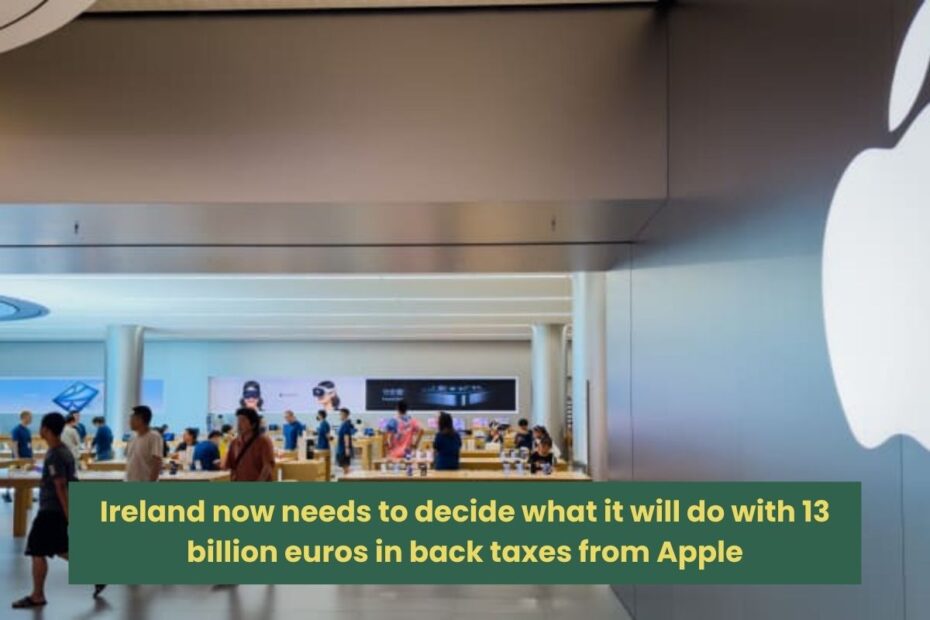Ireland now needs to decide what it will do with 13 billion euros in back taxes from Apple:-Ireland will get 14.1 billion euros ($14.4 billion) in back taxes from Apple thanks to a major decision from the EU’s top court. This is a windfall that Dublin had been trying to avoid for years.
Before the general election, which must happen by March of next year, Irish lawmakers will have to figure out how to best spend the extra money.
The choice comes at a strange time for Ireland: the country has a budget surplus of several billion euros, in part because it gets a lot of money from corporate taxes.
Ireland will get 14.1 billion euros ($14.4 billion) in back taxes from Apple thanks to a major decision from the EU’s top court. Dublin had been fighting for years to avoid this windfall.
The small EU member state is now in a tough political spot, but one that it would love to be in. Before the general election, which must happen by March of next year, Irish lawmakers will have to figure out how to best spend the extra money. The European Court of Justice (ECJ) said Tuesday that Apple must pay Ireland billions of euros in back taxes. This was the end of the case.
Tax justice supporters and the EU’s outgoing competition chief, Margrethe Vestager, both praised the decision. Vestager called it a “huge win” for European people. In a statement, Apple said it was unhappy with the decision. The Irish government, on the other hand, said the case was “now only relevant in terms of history.”
The Irish government said in a statement that it “does not give preferential tax treatment to any companies or taxpayers.” This has always been their goal. The company also said that it would start the process of sending the assets that were in a trust fund to Ireland.
Aidan Regan, an associate professor of political economy at University College Dublin in Ireland, told CNBC over the phone, “The Irish government in particular have been telling the Irish people and the rest of the world that they don’t want this 13 billion euros—it is not ours.”
“They’re under a lot of political pressure at home—there’s an election coming up probably in a couple of months—and now they might get an extra 13 billion euros at a time when there are huge problems with infrastructure and a housing crisis,” he said.
“I think the Irish government will be thinking a lot more about what they need to say to the Irish people before the election in a few weeks and not as much about what is going on in other countries or how this ruling will hurt their reputation.” When asked for response, a spokesperson for Ireland’s Finance Ministry told CNBC to look at the government’s written statement.
A lucrative decision
Ireland has said for years that the company that makes the iPhone shouldn’t have to pay back taxes that were not paid. It had fought the case because it thought it could hurt the country’s ability to get investments from companies that want to pay less tax on their earnings in other countries.
The European Commission said in 2016 that the country gave the U.S. tech giant “unlawful aid that Ireland is required to recover.” The ECJ’s decision on Tuesday confirmed that decision.
The choice comes at a strange time for Ireland: the country has a budget surplus of several billion euros, in part because it gets a lot of money from corporate taxes.
Robert Dever, a tax partner at the multinational law firm Pinsent Masons, told CNBC via email, “The decision is good for Ireland; it’s a windfall for the country. However, it goes against the government’s long-standing position that Ireland does not give preferential tax treatment to any taxpayers, companies or otherwise.”
“Any damage to Ireland’s reputation abroad should be kept to a minimum,” Dever said. “This is because the Irish tax code has changed a lot in the last few years, including the rules about corporate tax residency and how profits are given to branches of non-resident companies.”
“The process of transferring the assets in the escrow fund to Ireland will now begin following today’s judgment, but it will take a few months to complete,” he said. The escrow fund was set up to hold the money that Apple was supposed to owe in taxes and interest until the final decision was made.
Tax cooperation
The CEO of the Tax Justice Network, Alex Cobham, said on Tuesday that he was glad the ECJ made its decision about Apple’s tax situation in Ireland. The Tax Justice Network tracks how companies avoid paying taxes.
Cobham told CNBC via email, “But the ruling only serves to highlight how badly international tax rules fail to protect countries’ rights to tax economic activity that takes place in their own jurisdictions.”
“This shows how important it is to speed up the global reform process that is currently taking place through the talks of a UN framework convention on international tax cooperation,” he said.
Also on Tuesday, Chiara Putaturo, an EU tax expert at Oxfam, said that the ECJ’s decision “exposes EU tax havens’ love affair with multinationals.”
At the same time, Putaturo said, “This ruling must not be seen as a victory in and of itself; it must force the EU to close all loopholes that let corporations avoid paying their fair share of tax.”
“It’s time for them to stop bleeding governments dry of money and use that money to fight climate change and build hospitals, schools, and other services for people.”
